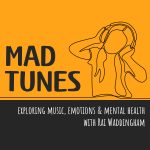These ‘Short Thoughts’ are simply brief (under 15 minute) explorations of topics or questions related to voices, visions, unusual beliefs, trauma or dissociation. If you have a question or topic area that interests you and you’d like me to create a ‘Short Thought’ about it, please either email me or leave a comment on this page.
Short Thought #3: Becoming A Person
Short Thought #3: Becoming A Person from Rai Waddingham on Vimeo.
This ‘short thought’ shares my experiences of being diagnosed with ‘schizophrenia’ and how I found my way back to feeling like a human being again. It explores the relationship between childhood trauma, identity, ‘psychosis’ and recovery. It was inspired by an interesting question asked by a trainee at my Hearing Voices workshop in Belgrade last year.
Short Thought #2: Get To Know Your Voices
Short Thought #2: Get To Know Your Voices from Rai Waddingham on Vimeo.
This is the second in a series of ‘Short Thoughts’ covering questions that I’m often asked (and topics that interest me). The theme of this ‘short’ is finding some creative ways to get to know your voices. For many, this may seem like a strange task. We can spend so long trying to block out the voices that we hear, especially if they talk about frightening or painful things, that the idea of exploring them may seem off-track. If you’d have spoken to me a decade ago I’d have said a similar thing. Still, finding ways of beginning to listen to (and think about) my voices has been an important step towards finding ways of living with them.
Short Thought #1: ‘Don’t Confront, Don’t Collude?’
Short Thought #1: ‘Don’t Confront, Don’t Collude?’ from Rai Waddingham on Vimeo.
This is the first in a series of free ‘shorts’. This one explores the mantra, woven deep into psychiatric practice – the belief that we should neither confront nor collude with beliefs that are seen as ‘delusional’. In the video, I share some of my thoughts about the challenges of this mantra, and question the idea of ‘collusion’ as being applicable to the mental health field.




Hi Rai, I learn so much as a voice hearer and traveler through the created world when you talk. I’m an affiliate HVN group facilitator near where I live on Long Island, NY USA. I’ve done my personal story publicly often and it’s never the same, yes different audiences, but also different emphasis’ based upon where I’m at in recovery at the time. I love the fact that you talk about not taking the microphone away in the 1st place. And in getting trained as a HVN facilitator that is stressed; to hold space, and I’ve both seen and benefitted from that often. I could praise and endorse the attitudes you and HVN, Ron Coleman and Karen Taylor amongst others espouse, and I’m so grateful you speak up from your hard fought life experience and inner work. God bless you, and God loves you. A teacher of mine told me that at a critical time in my life and I mean it to say I think you’re a winner at life!
Thanks for the thoughts!
How long did it take, after you stopped taking the meds, that you were able to function again?
It’s a hard one to answer. I was great for a few weeks and then things started to fall apart. It was a slow climb, putting things back together again, and I had the support of my loved ones (which isn’t always the case). I guess about 6 months after the worst of the so-called ‘psychosis’ had passed (though I was still living with difficult voices and unsual beliefs, I was most able to live my life). Then I found it was the restoriation of my emotional life that was causing me pain. I felt raw … it was as if my emotions were frozen when I started the drugs as a young person, and it took time for them to ease (and for me to find ways of living with them). Not the easiest of journeys, but one that was right for me at the time. After 10 years off meds, I began a small dose again a year ago after the birth of my child. I’m withdrawing again due to adverse effects (hello Tardive Dyskinesia and Akathisia), but I’m not anti-meds. I’m pro-choice.